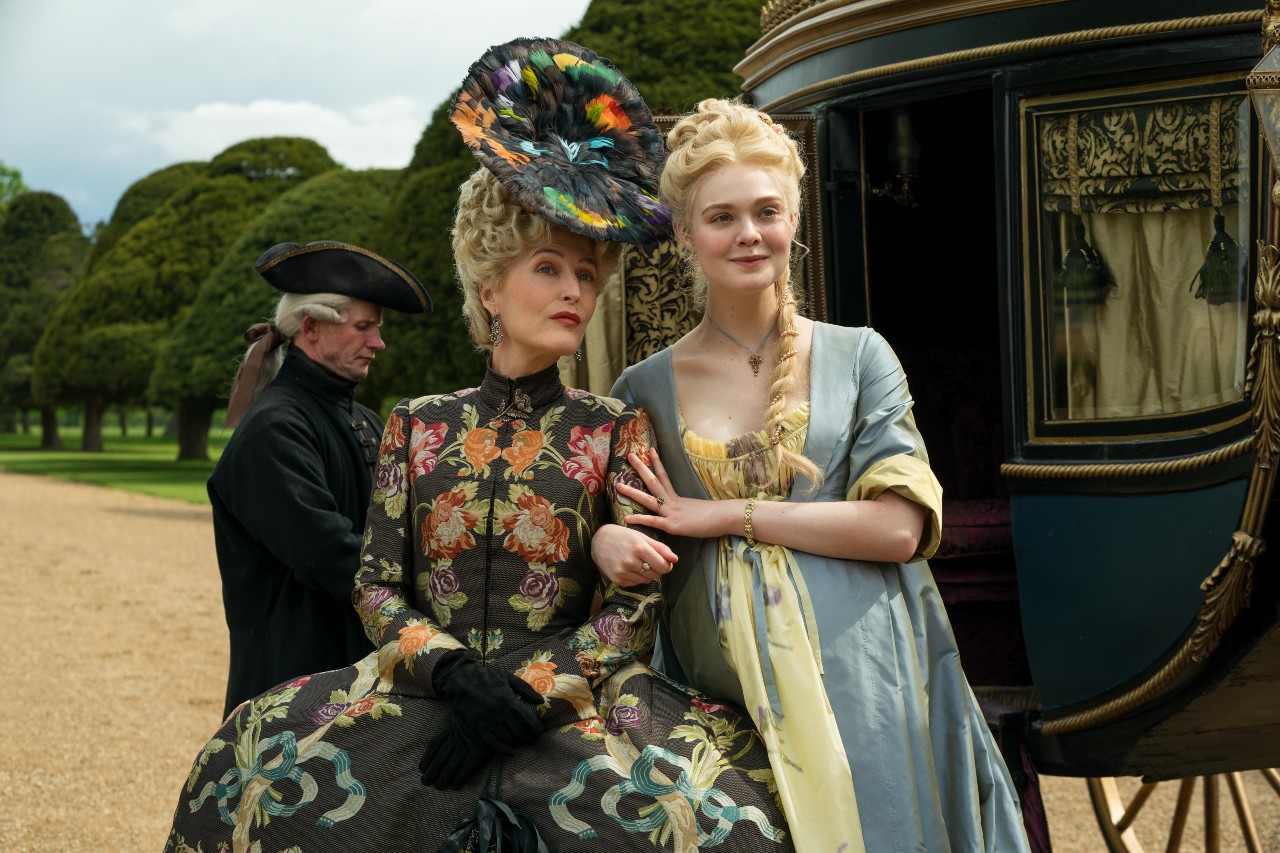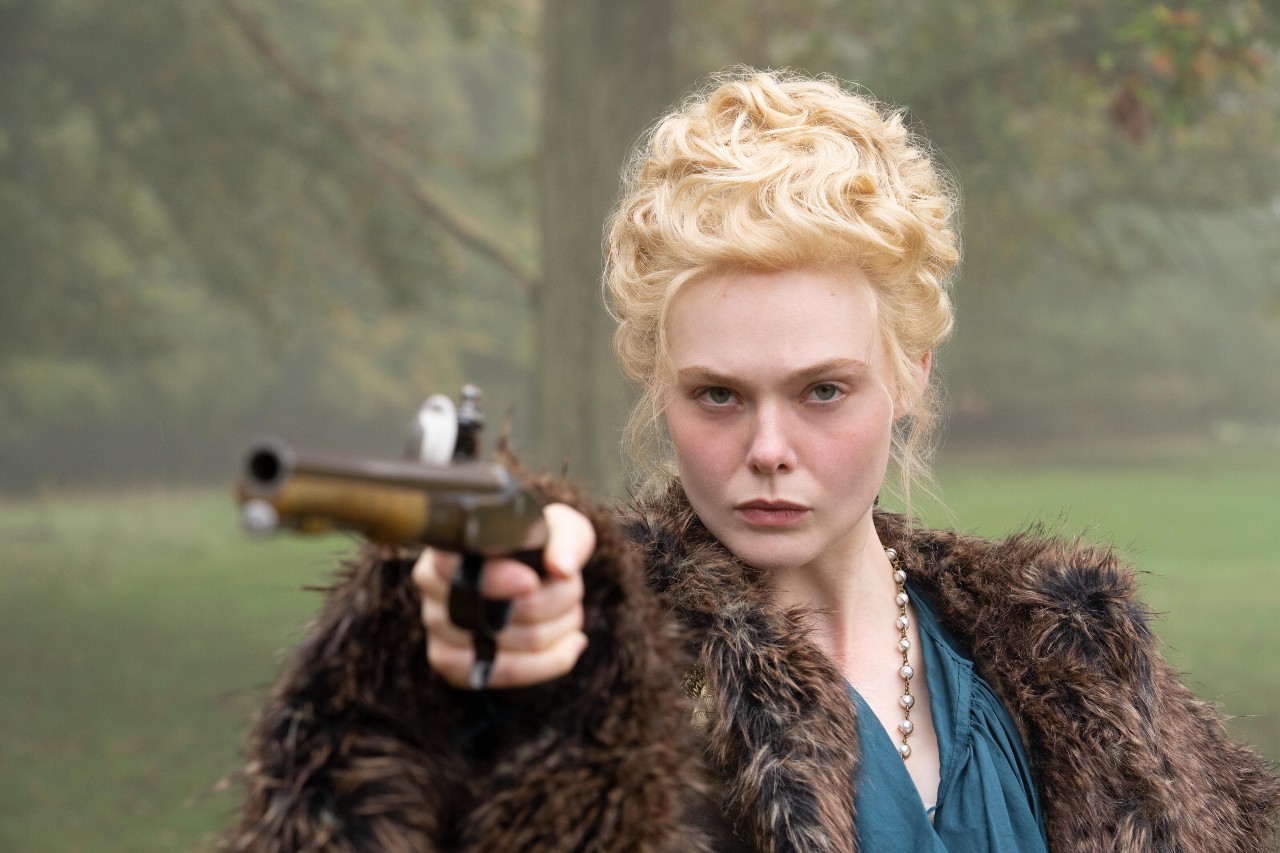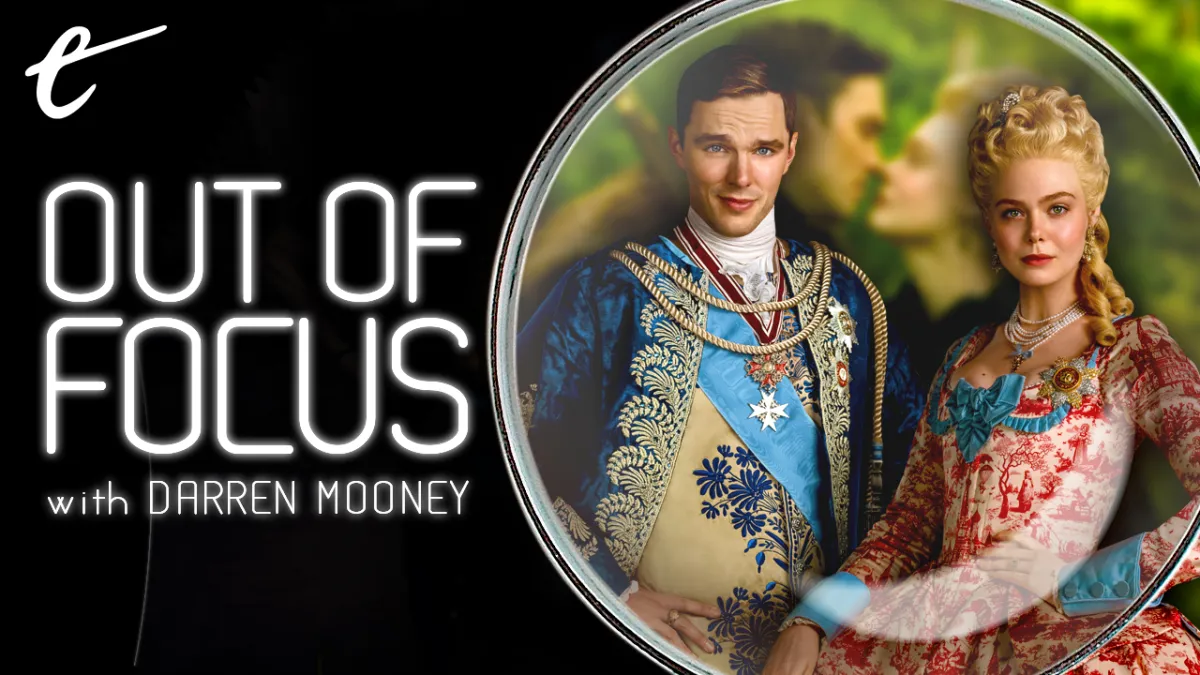It has been argued that the character of an institution is reflected in its leaders. Perhaps the opposite is true, with the character of a nation reflecting that of its leaders. This is the central thesis of The Great, Tony McNamara’s historical comedy, which streams on Hulu.
Billing itself as “an occasionally true story”, The Great follows young Empress Catherine (Elle Fanning) as she wrests control of Russia from her boorish husband Peter (Nicholas Hoult). Catherine seeks to drag Russia into the modern world, to embrace the arts and sciences while abolishing the caste system. Catherine longs to build a better world, fashioning a progressive ideal from a country steeped in ritual superstition and carnal hedonism.
The Great premiered in May 2020, just a few months after Catherine the Great, a prestige miniseries from HBO and Sky Atlantic tackling the same subject matter. Starring Helen Mirren and Jason Clarke, Catherine the Great was an austere and traditional period drama. As director Philip Martin wrote, Catherine the Great was a spectacle of “epic magnitude and budget-busting enormity: vast battling armies, brutal peasant rebellions and towering gold palaces.”
The Great was something very different. It is a much less opulent production. Much of the filming was confined to grand houses, like Hatfield House in Hertfordshire, Belvoir Castle in Leicestershire and Hever Castle in Kent. While the show occasionally ventures beyond the walls of the palace, most of the action takes place inside corridors, dining rooms, royal courts and private chambers. Over the show’s three seasons, the audience has come to appreciate the internal geography of the palace.
The world of The Great rarely extends beyond the palace itself. Occasionally, this becomes surrealist and absurdist, such as when Catherine’s coup against Peter turns the palace into a literal a battleground over the nation’s future. Sometimes, it feels allegorical, such as when Catherine launches her initiative to welcome girls into education by arranging for the tutoring of the court’s royal children or enacts her plan to elevate the serfs by promoting a palace servant (Ninette Finch).
This makes sense. The Great began as a stage play, and that sensibility carries over to the show. Catherine the Great embraced the maximalist scale that audiences expect in the modern prestige era, where these shows are often likened to blockbuster movies. In contrast, The Great harks back to a more traditional mode of television. After all, for much of its history, the medium owed more to theatre than to cinema, with early television drama compared to “photographed stage plays.”

Although it is an hour long and lacks a laugh track, The Great occasionally feels like a very polished sitcom. It is a show that has an established central cast of characters, many of whom are drawn in broad archetypes. Catherine is the show’s frustrated straightwoman. Peter is a petulant man-child with surprising vulnerability. General Velementov (Douglas Hodge) is the washed up, drunken, horny, belligerent military leader. “Archie” (Adam Godley) is the confused archbishop.
Many episodes employ familiar sitcom tropes. In “Stapler”, Catherine’s mother Joanna comes to visit, played by special guest star Gillian Anderson. Meanwhile, Catherine hopes to cement Russia’s international reputation by winning a prestigious international scientific competition. Desperate to win her affection, Peter promises to handle Russia’s entry. When he can’t come up with an idea, he decides to lazily rob the Norwegian delegation and present their invention as his own. With a few tweaks, this could be an episode of Always Sunny in Philadelphia.
While the show grapples directly with Catherine’s efforts to reform Russia, it also invests heavily in the lives of its character. During the second season, Catherine’s bookish advisor Orlo (Sacha Dhawan) tries to find some satisfaction in his love life. Catherine’s servant Marial (Phoebe Fox) is a former noble woman who has been demoted to servant, and who finds herself struggling to adapt when she is elevated once again. Catherine herself has to navigated her complicated relationship to Peter. It’s a classic sitcom set-up.
However, McNamara – who wrote the stage play and is credited as writer on almost every episode of the show – is using this familiar framework to underscore a larger point. The Great is undeniably a farce, but it is a farce with a purpose. The show seems to argue that there is no real difference between the politics of the nation and the interpersonal dynamics of the people who run it. Catherine’s efforts to manage the royal court are indistinguishable from her attempts to modernize Russia.
The entire show is allegory. McNamara has been candid about this fact. “In reality, Catherine felt she needed the church, the military, and the aristocrats to overthrow the thing,” he explained of the fictional characters that he invented whole clothe for the show, “so we needed people who represent all these things.” Archie might be a compelling character in his own right, a fully fleshed out human being that is a mess of complicated motivations, but he also represents the confused place of organized religion in modern life.

The Great argues that the health and the state of a nation, particularly an autocracy, is inseparable from that of its leader. Sometimes the body politic is just the body itself. Catherine wrestles with her internal emotional turmoil by slapping herself in the face, manifesting her unease through violence. Catherine spends most of the second season pregnant with her son, Paul, a none-too-subtle metaphor for the new Russia that she hopes to usher into being. That new Russia will be inexorably tied to Peter, the monster that she deposed yet cannot bring herself to vanquish.
This is not a novel idea. Political journalists frequently talk about leaders and nations in this way. There are plenty of historical examples, most of them tied to ideas of corruption and decline. Silvio Belusconi’s relationship to Italy has often been framed as symbiotic and symbolic, with Beppe Severgnini contending that “Berlusconi is not only Italy’s head of government, but the nation’s autobiography.” The idea is that, to understand Italy, one need only study Berlusconi.
Of course, The Great is not really about Russia. By its own admission, it is only “occasionally” a “true story.” However, many observers have read the show as a commentary on the Trump era. Hoult’s revelatory performance as Peter has frequently been compared to Donald Trump, although the actor himself insists that he took his cues from The Office. Still, whether intentionally or not, the show is filtered through the concerns and the anxieties of the past few years.
The past few years have seen an explosion in depictions of feudal or pre-industrial life in film and television, such as The Last Duel, Outlaw King, The King, The Northman and The Green Knight. Many of these are filtered through the lens of fantasy and science-fiction, in projects like The Rings of Power, The Wheel of Time, The Witcher, House of the Dragon, Dune, The Handmaid’s Tale and even Willow. McNamara himself has a screenwriting credit on The Favourite, a Best Picture nominee read by some as a commentary on “the so cheaply performed palace intrigues of today.”
Undoubtedly, there is a trend being chased, following the success of Game of Thrones. As has been noted, this trend was already underway before Donald Trump was elected, as reflected by projects like The Last Kingdom, Vikings and The Bastard Executioner. However, this fascination also plays out against the backdrop of concerns about the rise of “neo-feudalism”, the increased concentration of wealth and power in private ownership and distortion of individual rights. Perhaps these stories resonate.
Alexei Bayer has argued that Trump attempted to reshape the American government to resemble “the neo-feudal system” favored by Vladimir Putin in Russia. Certainly, the past decade has not been a healthy one for American democracy. Trump consistently demonstrated autocratic tendencies, and has a long history of corruption. Despite the democratic and institutional guardrails in place, there is no denying that – as President of the United States – Trump reshaped the country in his own image.

In January 2017, the Economist Intelligence Unit downgraded America from a “full democracy” to a “flawed democracy”, ironically placing it on par with Italy. That same year, the Civicus Monitor noted that the “civic space” had “narrowed” in the United States. The United States has consistently fallen in the rankings of Freedom House, ending the Trump era ranked below Western Europe and most of the Caribbean. That is before getting into the attempted coup in January 2021.
However, Trump’s influence was arguably more symbolic and metaphorical. According to Michael Goldfarb, “he gave a human shape to a fact that predated him and will continue after he’s gone.” David Smith contends that Trump “put himself at the center of American life and made his country look more like him.” Jennifer Senior argued that he made America more selfish. Jill Filipovic contended that the nation became “a reflection, sadly, of the President himself.”
“First Donald Trump remade the Republican Party in his own image, and now he is trying to remake America the same way,” alleged Thomas Friedman, “into a selfish, dishonest country with no close friends, totally unpredictable, free of any commitment to enduring values, ready to stab any ally in the back on Twitter if it doesn’t do our bidding and much more comfortable with mafia-like dictators than elected democrats.” Overseas, the image of America became inseparable from that of Trump.
Much of pop culture’s strongest response to Trump came through comedy. The animated sitcom Our Cartoon President ran for three seasons. Saturday Night Live enjoyed something of a creative renaissance by bringing in celebrity guest stars to cartoonishly lampoon the key figures of the era: Trump himself (Alec Baldwin), Sean Spicer (Melissa McCarthy), Brett Kavanaugh (Matt Damon). The only way to deal with the absurdity of what was happening was to reframe it as an absurdist joke. Even the black comedy of Succession felt like the perfect response to the Trump era.
The Great exists at the intersection of these two larger trends. Its period setting taps into those same underlying anxieties about the erosion of democratic norms and values. It reflects the concern about the power and wealth concentrated through accidents of birth in those unfit to wield it. It understands the bleak absurdity of the situation, that these figures shaping history are not masterminds or visionaries, but instead short-sighted buffoons driven by their own carnal impulses. These figures exert such gravity that they warp nations in their own grotesque self-image.
Karl Marx famously amended Georg Hegel’s theory that history repeats by specifying, “the first time as tragedy, the second time as farce.” The Great wryly suggests that sometimes the process doesn’t take as long, and that often the joke is on the nations these leaders embody.






Published: Aug 30, 2023 11:00 am